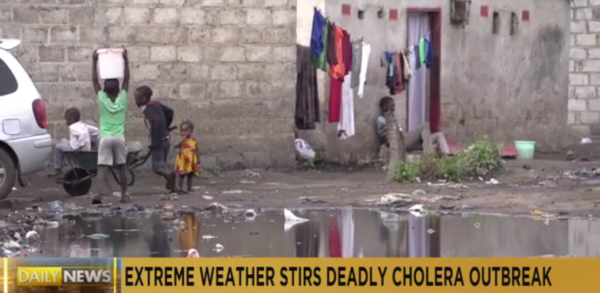Extreme Weather Fuels Cholera Outbreaks Across East and Southern Africa, Urgent Action Needed
Extreme weather conditions have sparked cholera outbreaks in various parts of East and Southern Africa, painting a grim picture of suffering and neglect amid environmental challenges.
In Zambia, stagnant pools of contaminated water mar the streets of impoverished communities like Njele and Lilanda, where the Banda family tragically lost their young son to the disease.
Despite the simplicity of treatment and prevention measures, including readily available vaccines, preventable deaths like Ndanji Banda’s persist due to a lack of access to proper healthcare and sanitation.
Local residents, such as Elias Banda, voice frustration with government inaction, citing inadequate sewage management and neglect of basic infrastructure.
The situation is mirrored in neighbouring Malawi, Zimbabwe, and beyond, where floods and droughts exacerbate the spread of cholera. In Kenya, recent flooding quickly led to a surge in cases, underscoring the link between extreme weather events and disease outbreaks.
The World Health Organization (WHO) identifies cholera as a disease of poverty, thriving in environments with poor water quality and sanitation, primarily affecting regions like Africa and South Asia.
Africa’s vulnerability to climate change and weather phenomena like El Nino compounds the risk, creating what experts describe as a “perfect storm” for disease proliferation.
Compounding the crisis is a global shortage of cholera vaccines, further limiting the ability to contain outbreaks in poorer nations.
In Zimbabwe, where drought and El Nino exacerbate the situation, residents like Tracy Dzinoreva remain fearful despite vaccination efforts, as underlying issues of water contamination and inadequate sanitation persist.
Augustine Chonyera’s eye-opening experience in rural Zimbabwe, where cholera’s impact is devastating communities, underscores the urgent need for investment in local infrastructure.
Repairing dilapidated water pipes and improving sewage systems are essential steps towards preventing future outbreaks.
Additional source: Africanews



